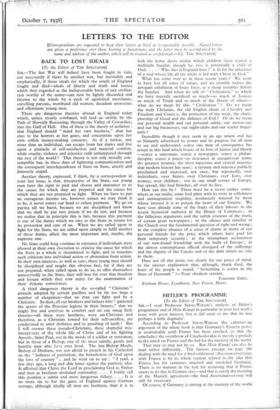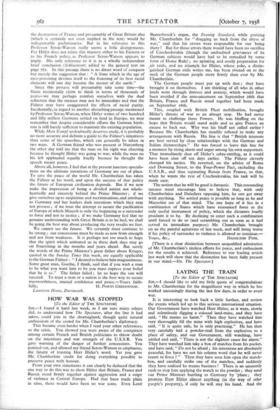HITLER'S PROGRAMME
[To the Editor of THE SPECTATOR]
Sta,—I read Professor Seton-Watson's analysis of Hitler's programme and of Mein Kampf in particular in your last week's issue with great interest, but it did seem to me that he was perhaps a little dogmatic: According to Professor Seton-Watson the culminatng argument of the whole book is that Germany's Eastern policy is unattainable until France has been crushed, so that (he concludes) the overthrow of Czechoslovakia is merely a prelude to the attack on France and the bid for the mastery of the world.
That may or may not be so. But Mein Katnpf can also be read rather differently. The famous passage on page 766 dealing with the need for a final settlement (Auseinandersetzung) with France is by its whole context related to the idea that France has for centuries attacked and encircled Germany. There is no warrant in the text for assuming that if France ceases to do this in German eyes—and that is surely the meaning of the Munich agreement—the final Auseinandersetzung will still be necessary.
Of course, if Germany is aiming at the mastery of the world
the destruction of France and presumably of Great Britain also (which is certainly not even implied in the text) would be
indispensable preliminaries. But in his reference to this Professor Seton-Watson really seems a little disingenuous. For Hitler does not relate this mastery either to his Eastern or to his French policy, as Professor Seton-Watson appears to
imply. His only reference to it is in a wholly independent brief conclusion (Schlusswort) added to the general text on
page 782. In this passage there is no direct word of conquest but merely the suggestion that : " A State which in the age of race-poisoning devotes itself to the fostering of its best racial elements will one day become the master of the earth."
Since this process will presumably take some time—the Nazis incidentally claim to think in terms of thousands of years—we may perhaps comfort ourselves with the dual reflection that the menace may not be immediate and that the Fiihrer may have exaggerated the effects of racial purity. Incidentally, in regard to another disturbing passage mentioned by Professor Seton-Watson, when Hitler writes of two hundred and fifty million Germans settled on land in Europe, we may remember that despite considerable efforts the German birth- rate is still barely sufficient to maintain the existing population.
While Mein Kampf undoubtedly deserves study, it is probably no more accurate and definite a guide to the Fiihrer's intentions than some of his speeches, which can generally be taken in two ways. A German friend who was present at Nuremberg the other day told me that the man on his right was cheering because he thought Hitler was going to war, while the man on his left applauded equally loudly because he thought the speech meant peace.
Above all, however, I feel that at the present juncture specula- tions on the ultimate intentions of Germany are out of place. To save the peace of the world Mr. Chamberlain has taken the Fiihrer at his word, and upon the success of that policy the future of European civilisation depends. But if we now make the impression of being a divided nation not whole- heartedly and sincerely behind the Prime Minister ; if we give ourselves up to suspicions and recriminations, and attribute to Germany and her leaders dark intentions which they may not possess ; if we treat the attempt to secure the pacification of Europe of which Munich is only the beginning as a surrender to force and not to justice ; if we make Germany feel that no genuine understanding with Great Britain is to be had, we shall be going the best way about producing the very results we fear.
We cannot see the future. We certainly must continue to be strong ; our concessions must be made as now from strength and not from weakness. It is perhaps not too much to hope that the spirit which animated us in these dark days may go on flourishing in the months and years ahead. But surely the words of the Prime Minister's great father about Kruger, quoted in the Sunday Times this week, are equally applicable to the German Fiihrer : " I desired to believe him magnanimous. Some great man, Goethe, I think, said that if you wish a man to be what you want him to be you must express your belief that he is so." The father failed ; let us hope the son will succeed. To trust a man or a nation is the best way to secure trustworthiness, mutual confidence and peace.—Yours faith-















































 Previous page
Previous page